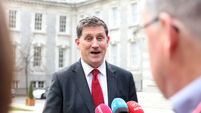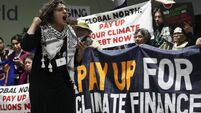Climate finance talks urged to reach settlement ahead of Trump presidency

Two weeks of talks on climate finance are scheduled to end on Friday, with many developing countries frustrated at what they believed was a lack of progress in the first week of the Cop29 summit in Azerbaijan. Picture: Peter Dejong/AP
Governments meeting to forge a global settlement on climate finance must get over their differences this week and come to a deal, because if talks carry on until next year they stand little chance with Donald Trump in the White House, the German development minister has said.
Jochen Flasbarth, one of the most influential ministers at the UN Cop29 summit, said that if the final days of the summit did not produce a breakthrough, countries would face a much tougher prospect.
“Postponing the decision here to Belém [the city in northern Brazil where next year’s UN climate summit will be held] is not something advisable,” he said.
“We have an increasing crisis in the world, war in the world, and countries disappearing from global solidarity — like the US — and the departure of the Argentinian delegation. These are clear signals that we will get in difficult times.”
Two weeks of talks on climate finance are scheduled to end on Friday, with many developing countries frustrated at what they believed was a lack of progress in the first week of the Cop29 summit in Azerbaijan.
Poorer countries want at least $1tn a year to help them cut greenhouse gas emissions and cope with the impacts of extreme weather.
Rich countries have not yet put a figure on how much they will be prepared to contribute.
A study last week by leading economists suggested that about $500bn should come from the private sector, with about $250bn coming from multilateral development banks such as the World Bank.
The direct provision of grants and loans from developed to developing countries needs to roughly double, from about $40bn today, they found. However, higher income countries have not yet agreed to that.
The talks have also been beset by controversy over the influence of fossil fuel companies. Oil and gas make up 90% of Azerbaijan’s exports, and were described by the country’s president, Ilham Aliyev, in the opening ceremony as a “gift of God”.
Fossil fuel lobbyists at Cop29 outnumber the delegations of the 10 most vulnerable countries, and have been given “red carpet” treatment.
A group of senior voices on the climate — including a former UN secretary general, a former UN climate chief, and a former UN climate envoy — wrote to the UN last week calling for reforms to the process of Cops, which stands for “conference of the parties”, under the 1992 UN framework convention on climate change.
Mr Flasbarth is a respected figure on climate finance, having taken charge previously of the key issue of ensuring that developed countries met their previous target of providing $100bn a year for poorer countries — a target that was supposed to be met in 2020, but was finally met two years late.
The director of the Power Shift Africa thinktank, Mohamed Adow, said: “We need Mr Flasbarth to be working with other developed country ministers to resolve the climate finance stalemate. The world expects a clear signal of the financing of climate action from Baku, and we can’t afford to fail in that task here in Baku because of the fear of a Trump presidency.
"It’s important we don’t just accept a bad deal here out of fear of the incoming Trump administration.”
- Guardian
CLIMATE & SUSTAINABILITY HUB










